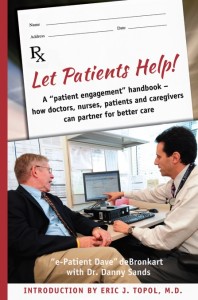Dave deBronkart, better known as "e-Patient Dave", is a marketing expert who on January 3, 2007, at 09:02, received a call from his doctor: "We have found something in your lung." DeBronkart remembers that moment with precision because that news changed his life. From that moment he abandoned his normal citizen status to become a metastatic patient of a tumour of renal origin and, given his clinical condition, in an advanced cancer patient. DeBronkart received a treatment that normally does not work, but luckily it worked for him.
So far a story with a happy ending, but Dave's story highlights his attitude (just look at the cover of the book with a picture of him with his doctor, Dr. Danny Sands). With the sentence above, far from adopting a fearful and docile attitude, searched Google, went to find other patients with the same diagnosis, and sat down to talk to his doctors using his own criteria, sharing with them each of the decisions that he was taking. Now e-Patient Dave has become a leader in what we call patient empowerment.
I recommend this 16-minute video where you can see e-Patient Dave in action (he has almost half a million views).
The Basics of the e-Patient Dave Movement
DeBronkart argues that patients must be actors in their clinical process. Right now, he says, the situation is the opposite: when transcendental things are decided (for example on a tumours’ committee) patients are never there and they are spoken of in third person. They are simply someone in the waiting room, someone who will only receive proper communication after those who know better have understood his situation. Doctors think they know everything, but deBronkart says that the patient also know things that sometimes are keys to the success of the treatment. Therefore, patients should stop being an underutilized resource and this can only be achieved if they are well informed from the beginning of their processes.
DeBronkart, from his marketing expert position, makes a parenthesis in his book, about what the concept of "informed patient" entails. For some, he says, it’s about intoxicating people with probabilities and numbers, but doctors should know that the value of information has more impact than information in itself. If they are willing to involve patients in clinical processes, doctors should understand the patient’s circumstances and capacities so they can explain things with the certainty that they are being understood.
Some recommendations for doctors
Dr. Danny Sands, in a chapter of the book, advises that doctors ought to encourage patients to get involved and therefore gives them some clues on how to encourage them with certain approaches: a) know how to recommend web pages, b) offer contacts with similar patients c) offer them their e-mail address, d) ask about patients' concerns, e) discuss pros and cons of each therapeutic option, f) encourage the patient to talk about their preferences, g) ask the patient what have they understood, and (h) sharing reports, results and clinical notes.
Some recommendations for patients
This chapter of the book is written by Dr. Sands himself, but the recommendations, addressed to patients, are approved by e-Patient Dave: a) health care isn’t a spectators’ sport so get involved, b) prepare a list of questions prior to each visit, c) be respectful of the time that the doctor can dedicate to the visit, d) when the communication does not work correctly, the patient should have the courage to let the doctor know about it, e) take notes and contrast them with doctor’s notes, f) avoid demanding tests and treatments, g) instead, if as a patient, you have an idea of what to do, you should know how to share it with the doctor, how to defend it and how to listen, h) you should have the courage to let each care professional know which things make you feel good and which ones are causing discomfort.
The intention of this post isn’t to promote a movement so that all people suffering from serious illnesses behave like the original e-Patient Dave. I can hope so, but the main point is that every patient has his own way of being: some are braver, some are fearful and very little can be done for the social extension of the deBronkart movement. However, as this is a blog aimed at clinical professionals, the message I’d like to convey is this: it would be nice that, even if only with the most complex cases, doctors would take notice of Dr. Danny Sands’ attitude and recommendations.
Jordi Varela
Editor
Jordi Varela
Editor



I'm 40 years old female I tested genital herpes (HSV1-2) positive in 2002. I was having bad outbreaks. EXTREMELY PAINFUL. I have try different kinds of drugs and treatment by the medical doctors all to know was avail. Six months ago I was desperately online searching for a helpful remedies for genital herpes (HSV1-2) cure, which i come across some helpful remedies on how Dr OYAGU have help so many people in curing genital herpes (HSV1-2) with the help of herbal treatment because I too believe there is someone somewhere in the world who can cure herpes completely. At of the past 2 months, however, I've been following his herpes protocol Via oyaguherbalhome@gmail.com or +2348101755322 and it stopped all outbreaks completely! To my greatest surprise I was cured completely by following the protocol of his herbal medicine . Don't be discouraged by the medical doctors. There is a cure for HSV with the help of herbs and roots by a herbalist Dr call Dr OYAGU he is so kind and truthful with his herbal treatment, kindly contact him for more information Via oyaguherbalhome@gmail.com or WhatsApp DR on +2348101755322 you will be lucky as i am today
ReplyDelete